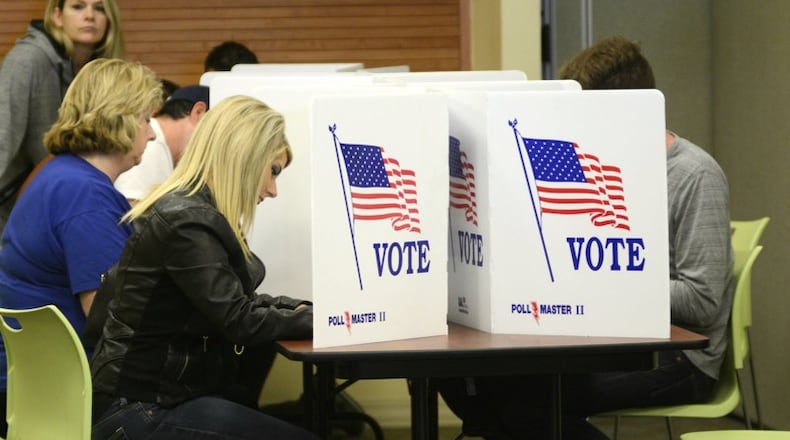Reed chose the write-in route, which is done by filing a declaration of intent form and no signatures needed. Now as a write-in candidate, Reed can earn votes, but voters need to know to write his name on their ballot.
“The entire system is stacked against us from the very start as write-in candidates,” Reed said.
The requirement is set in state law, and was affirmed by the U.S. 6th Circuit District Court of Appeals eight years ago in a lawsuit by former Butler County politician Greg Jolivette against then-Ohio Secretary of State Jon Husted. The 2012 ruling said the Equal Protection Clause did not apply “because of the differences between the pathways to the ballot of partisan versus independent candidates in Ohio.”
The chance of a write-in candidate winning a race is small, said Cedarville University political science professor Mark C. Smith.
“The write-in candidacy is just the last option for movements and candidates to subvert the system,” he said.
Smith said allowing a write-in candidate is an acknowledgment that citizens outside of a political party should have a chance to run, which “is similar to the initiative process where voters can put legislation on the ballot in circumvention of the legislature.”
Reed said he’s running because he’s “tired of a two-party system with the control that they have, which is why I chose to run as an independent.”
Reed’s write-in candidacy was certified by the Butler County Board of Elections on March 30, and the board certified Kent Keller Sr. and Johnny Hamilton on Aug. 25 as write-in candidates for the 4th Ohio Senate District and 51st Ohio House District, respectively. The deadline was Monday.
This is Keller’s first time running for political office, though his wife is Ohio Rep. Candice Keller, R-Middletown. She lost her primary bid to the GOP 4th Ohio Senate nominee to Ohio Rep. George Lang, R-West Chester Twp. The 4th Ohio Senate District represents nearly all of Butler County.
“This will be more a race of conscience than anything,” Keller said. “We know it’s an uphill battle ... . We will simply run the same grassroots campaign we always do.”
This would be Hamilton’s third race and first as a write-in candidate. The Fairfield resident unsuccessfully ran for Fairfield City Council in 2015 and for the 51st House District seat in 2016.
Though “write-in candidacies are unsuccessful in almost every situation,” Smith said there are a few exceptions but it requires name recognition.
The late former U.S. Sen. Strom Thurmond won a 1954 write-in campaign for a U.S. Senate seat in South Carolina. In 2010, U.S. Sen. Lisa Murkowski, R-Arkansas, won a write-in candidate campaign in her state’s general election after she lost in the primary. Ohio law does not permit candidates to run in any general election race if they lost a party nomination in the proceeding primary.
Voters can protest the candidates on the ballot by supporting a write-in candidate, Smith said. U.S. Sen. Rob Portman, R-Cincinnati, cast a protest vote against President Donald Trump in 2016 and wrote in Mike Pence’s name. However, that vote did not count as Pence was not a certified write-in candidate.
Only certified write-in candidates will be counted, and voters can ask for the write-in candidate list at their polling location on Election Day or at the elections board during in-office early voting, which starts Oct. 6. For those voting at home, the list will be made available online at elections.bcohio.gov or by calling the elections office at 513-887-3700.
IMPORTANT ELECTION DATES
Sept. 18: Military and overseas absentee voting begins
Oct. 5: Voter registration deadline. Ohioans can register online or until 9 p.m. at their county board of elections office
Oct. 6: Absentee voting and in-office early voting can begin.
Oct. 24-25: First of two weekends for in-office early voting at boards of elections
Oct. 31-Nov. 1: Second of two weekends for in-office early voting at boards of elections
Nov. 2: Last day for in-office early voting, all absentee ballots must be postmarked by this date. Last day for military and overseas absentee voting
Nov. 3: Election Day. Polls open from 6:30 a.m. to 7:30 p.m., and absentee ballots may be hand-delivered to the elections office by 7:30 p.m.
About the Author

